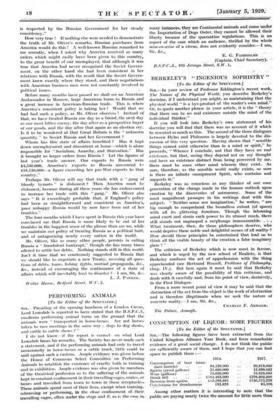BERKELEY'S " INGENIOUS SOPHISTRY " • ¶To the Editor of
the SPECTATOR.] • , ;
your review of Professor Eddington's recent work, The Nature of the Physical World, you describe Berkeley's doctrine, if I understand you aright, as maintaining that the physical world " is a bye-product of the reader's own mind." Or, to quote another phrase in your article, it is the " theory that there can be no real existence outside the mind of the individual thinker." -
If you will look into Berkeley's own statement of his doctrine you will find that there was no account of it which he resented so much as this. The second of the three dialogues between Hylas and Philonous is largely devoted to the dis- cussion of this very question. Having shown that " sensible things cannot exist otherwise -than in a mind or spirit;" he proceeds, " Whence I conclude, not that they have' no real existence, but that, -seeing they depend not on my thought and have an existence distinct from being perceived by me, there must be some other- mind wherein they exist.- -As sure, therefore, as the sensible world really exists, so sure is there an infinite omnipresent Spirit, who contains and supports it."
Berkeley was as conscious as any thinker of our own generation of the change made in the human outlook upon creation by the discoveries of astronomy. Some of the most magnificent passages in his writings deal • with this subject. " Neither sense nor imagination," he writes, " are big enough to comprehend the boundless extent (of space) with all its glittering furniture. Though the labouring mind exert and strain each power to its utmost reach, there still 'stands out ungrasped a surplusage immeasurable: . What treatment, then, do those philosophers deserve, who would deprive these noble and delightful scenes of all reality.? How should those principles be entertained that lead us to think all the visible beauty of the creation a false- imaginary glare ? "
The criticism of Berkeley which is now most in favour, and which is urged by the new school of Realists, is that Berkeley confuses the act of apprehension with-'the -thing apprehended (see Bertrand Russell, Problems of Philosophy, chap. IV.). But here again it must be said that Berkeley was clearly aware of the possibility of this criticism, and deals with it carefully and, from his point of view? decisively, in the First Dialogue.
From a more recent point of view it may be said that the distinction of the act from the object is the work of abstraction and is therefore illegitimate• when we seek the nature of concrete reality.—I am, Sir, &c.,






































 Previous page
Previous page